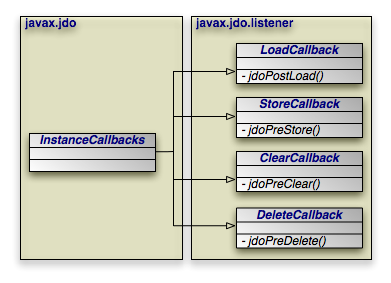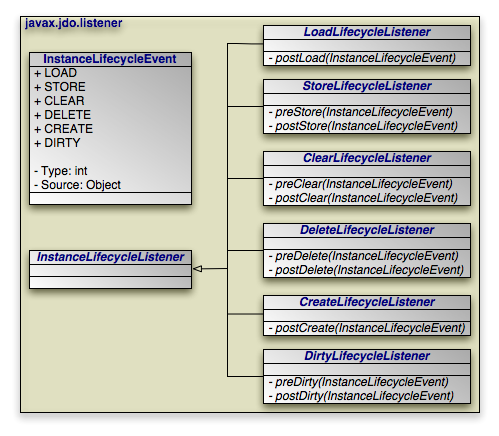It is often necessary to perform various actions at different stages
of a persistent object's lifecycle. JDO includes two mechanisms for
monitoring changes in the lifecycle of your persistent objects: the
InstanceCallbacks interface, and the
InstanceLifecycleListener event framework.

Your persistent classes can implement the
InstanceCallbacks
family of interfaces to to receive callbacks when certain JDO
lifecycle events take place. There are four callbacks available:
The
LoadCallback.jdoPostLoadmethod is called by the JDO implementation after the default fetch group fields of your class have been loaded from the datastore. Default fetch groups are explained in Chapter 5, Metadata; for now think of the default fetch group as all of the primitive fields of the object. No other persistent fields can be accessed in this method.jdoPostLoadis often used to initialize non-persistent fields whose values depend on the values of persistent fields. An example of this is presented below.StoreCallback.jdoPreStoreis called just before the persistent values in your object are flushed to the datastore. You can access all persistent fields in this method.jdoPreStoreis the complement tojdoPostLoad. WhilejdoPostLoadis most often used to initialize non-persistent values from persistent data,jdoPreStoreis usually used to set persistent fields with information cached in non-persistent ones. See the example below. Note that the persistent identity of the object may not have been assigned yet when this method is called.The
ClearCallback.jdoPreClearmethod is called before the persistent fields of your object are cleared. JDO implementations clear the persistent state of objects for several reasons, most of which will be covered later in this document. You can usejdoPreClearto clear non-persistent cached data and null relations to other objects. You should not access the values of persistent fields in this method.DeleteCallback.jdoPreDeleteis called before an object transitions to the deleted state. Access to persistent fields is valid within this method. You might use this method to cascade the deletion to related objects based on complex criteria, or to perform other cleanup.
Unlike the PersistenceCapable interface,
you must implement the InstanceCallbacks
interfaces explicitly if you want to receive lifecycle callbacks.
![[Note]](img/note.gif) | Note |
|---|---|
The |
Example 4.3. Using Callback Interfaces
/**
* Example demonstrating the use of the InstanceCallbacks interface to
* persist a java.net.InetAddress and implement a privately-owned relation.
*/
public class Host
implements LoadCallback, StoreCallback, DeleteCallback
{
// the InetAddress field cannot be persisted directly by JDO, so we
// use the jdoPostLoad and jdoPreStore methods below to persist it
// indirectly through its host name string
private transient InetAddress address; // non-persistent
private String hostName; // persistent
// set of devices attached to this host
private Set devices = new HashSet ();
// setters, getters, and business logic omitted
public void jdoPostLoad ()
{
// form the InetAddress using the persistent host name
try
{
address = InetAddress.getByName (hostName);
}
catch (IOException ioe)
{
throw new JDOException ("Invalid host name: " + hostName, ioe);
}
}
public void jdoPreStore ()
{
// store the host name information based on the InetAddress values
hostName = address.getHostName ();
}
public void jdoPreDelete ()
{
// delete certain related devices when this object is deleted, based
// on business logic
PersistenceManager pm = JDOHelper.getPersistenceManager (this);
pm.deletePersistentAll (filterDependents (devices));
}
}

![[Note]](img/note.gif) | Note |
|---|---|
The |
Only persistent classes can implement the
InstanceCallbacks interfaces. This makes sense for
lifecycle actions such as caching internal state and deleting
dependent relations, but is clumsy for cross-cutting concerns like
logging and auditing. The lifecycle listener event framework solves
this problem by allowing non-persistent classes to subscribe
to lifecycle events. The framework consists of a common event
class, a common super-interface for event listeners, and several
individual listener interfaces. A concrete listener class can
implement any combination of listener interfaces.
InstanceLifecycleEvent: The event class. The source of a lifecycle event is the persistent object for which the event was triggered.InstanceLifecycleListener: Common base interface for all listener types.InstanceLifecycleListenerhas no operations, but gives a measure of type safety when adding listener objects to aPersistenceManagerorPersistenceManagerFactory. See Chapter 8, PersistenceManager and Chapter 7, PersistenceManagerFactory.LoadLifecycleListener: Listens for persistent state loading events. ItspostLoadmethod is equivalent to theInstanceCallbacks.jdoPostLoadmethod described above.StoreLifecycleListener: Listens for persistent state flushes. ItspreStoremethod is equivalent to theInstanceCallbacks.jdoPreStoremethod described above. ItspostStorehandler is invoked after the data for the source object has been flushed to the database. UnlikepreStore, the source object is guaranteed to have a persistent identity by the timepostStoreis triggered.ClearLifecycleListener: Receives notifications when objects clear their persistent state. ItspreClearmethod is equivalent toInstanceCallbacks.jdoPreClear. ThepostClearevent is sent just after the source object's state is cleared.DeleteLifecycleListener: Listens for object deletion events. ItspreDeletemethod is equivalent toInstanceCallbacks.jdoPreDelete. ItspostDeletehandler is triggered after the source object has transitioned to the deleted state. Access to persistent fields is not allowed inpostDelete.CreateLifecycleListener: ThepostCreateevent is fired when an object first transitions from unmanaged to persistent-new, such as during a call toPersistenceManager.makePersistent.DirtyLifecycleListener: Dirty events fire when an object is first modified (in JDO parlance, becomes dirty) within a transaction. The runtime invokespreDirtybefore applying the change to the object, andpostDirtyafter applying the change.